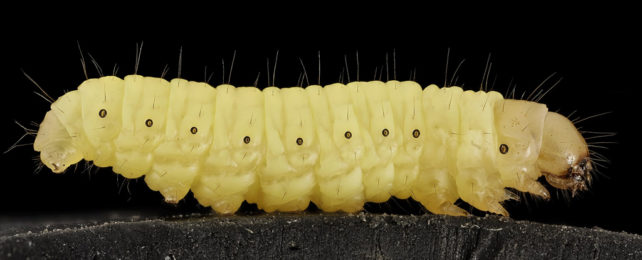Researchers have identified a pair of enzymes in wax worm saliva that naturally break down a common form of plastic within a few hours at room temperature.
Polyethylene is among the most widely used plastics in the world, having uses in everything from food containers to shopping bags. Unfortunately, its robustness also makes it a stubbornly persistent pollutant – the polymer needs to be treated with high temperatures to kickstart the degradation process.
Wax worm saliva contains the only enzymes we know of that can work on untreated polyethylene, which makes these naturally occurring proteins potentially rather useful for recycling.
Federica Bertocchini, a molecular biologist and amateur beekeeper, accidentally discovered wax worms have a talent for degrading plastic a few years ago.
"At the end of the season, usually beekeepers put some empty beehives in a storage room, to put them back in the field in the spring," Bertocchini recently told AFP.
"One year I did that, and I found my stored honeycombs plagued with wax worms."
She cleaned the honeycomb and put all the wax worms in a plastic bag. When she came back a short time later, she found the bag "riddled with holes".
Wax worms (Galleria mellonella) are larvae that eventually transform into short-lived wax moths. In the larval stage, the worms make themselves right at home in bee hives where they feed on wax and pollen.
After this chance discovery, Bertocchini and her team at Madrid's Margarita Salas Center for Biological Studies set to work analyzing the wax worm saliva, publishing their findings in Nature Communications.
The researchers used two methods: gel permeation chromatography, which separates molecules based on their size, and gas chromatography-mass spectrometry, which identifies fragments of molecules based on their mass-charge ratio.
They confirmed that the saliva did in fact break the long hydrocarbon chains found in polyethylene into small, oxidized chains.
They then used proteomic analyses to identify "a handful of enzymes" in the saliva, two of which were shown to oxidize polyethylene, the researchers write.
The researchers named these enzymes 'Demetra' and 'Ceres', after the ancient Greek and Roman goddesses of agriculture, respectively.
"To the best of our knowledge, these polyethyleneases are the first enzymes capable of producing such modifications on a polyethylene film working at room temperature and in a very short time," the researchers write.
As these two enzymes overcome "the first and most difficult step in the degradation process", they add, the process could represent an "alternative paradigm" for waste management.
Although it's early days in investigations, these enzymes could potentially be mixed with water and poured over plastic in a waste management facility, Bertocchini told AFP. They could be used in remote locations where waste facilities are not available, or even in individual homes.
As promising as their saliva is, wax worms aren't the only organisms known to degrade plastic.
A 2021 study showed that microbes and bacteria in the oceans and the soil were evolving to eat plastic.
In 2016, researchers reported a bacterium at a Japanese waste site that could break down polyethylene terephthalate, also known as PET or polyester. This later inspired scientists to create an enzyme that could quickly break down plastic drink bottles.
Around 400 million metric tons of plastic waste are generated every year worldwide, of which around 30 percent is in the form of polyethylene. Of the 7 billion tons generated by the world to date, only 10 percent has been recycled, leaving the world with a considerable legacy of waste.
Reducing consumption and reusing materials will undoubtedly limit the impact plastic waste has on the environment, but having a toolkit for cleaning up our mess could help us get on top of our plastic waste problem.
The new study was published in Nature Communications.
